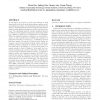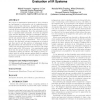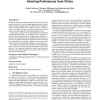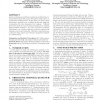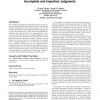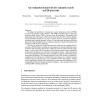164
click to vote
SIGIR
2012
ACM
13 years 4 months ago
2012
ACM
In this paper, we propose a novel top-k learning to rank framework, which involves labeling strategy, ranking model and evaluation measure. The motivation comes from the difficul...
153
click to vote
SIGIR
2012
ACM
13 years 4 months ago
2012
ACM
We propose a mathematical framework for query selection as a mechanism for reducing the cost of constructing information retrieval test collections. In particular, our mathematica...
150
click to vote
WSDM
2012
ACM
13 years 9 months ago
2012
ACM
We present a new approach for personalizing Web search results to a specific user. Ranking functions for Web search engines are typically trained by machine learning algorithms u...
128
click to vote
CIKM
2011
Springer
14 years 2 months ago
2011
Springer
Evaluating rankers using implicit feedback, such as clicks on documents in a result list, is an increasingly popular alternative to traditional evaluation methods based on explici...
155
click to vote
SIGIR
2011
ACM
14 years 5 months ago
2011
ACM
We study how to best use crowdsourced relevance judgments learning to rank [1, 7]. We integrate two lines of prior work: unreliable crowd-based binary annotation for binary classi...
131
click to vote
SIGIR
2011
ACM
14 years 5 months ago
2011
ACM
Query performance prediction is aimed at predicting the retrieval effectiveness that a query will achieve with respect to a particular ranking model. In this paper, we study quer...
134
click to vote
CORR
2006
Springer
15 years 2 months ago
2006
Springer
Clickthrough data is a particularly inexpensive and plentiful resource to obtain implicit relevance feedback for improving and personalizing search engines. However, it is well kn...
117
click to vote
NIPS
2007
15 years 3 months ago
2007
We propose a model that leverages the millions of clicks received by web search engines to predict document relevance. This allows the comparison of ranking functions when clicks ...
141
click to vote
CIKM
2006
Springer
15 years 5 months ago
2006
Springer
We consider the problem of evaluating retrieval systems using incomplete judgment information. Buckley and Voorhees recently demonstrated that retrieval systems can be efficiently...
180
click to vote
IICS
2010
Springer
15 years 6 months ago
2010
Springer
: We address the problem of evaluating peer-to-peer information retrieval (P2PIR) systems with semantic overlay structure. The P2PIR community lacks a commonly accepted testbed, su...
